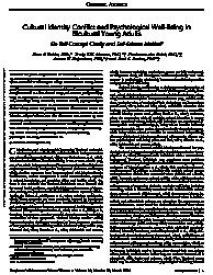Cultural Identity Conflict and Psychological Well-Being in Bicultural Young Adults
The present study examined the relationship between cultural identity conflict and psychological well-being, as well as the role of self-concept clarity and self-esteem in mediating this linkage. Elevated cultural identity conflict was hypothesized to be associated with lower psychological well-being via both (lower) self-concept clarity and (lower) self-esteem, with self-concept clarity preceding self-esteem. In a cross-sectional design, 473 bicultural young adults (age range, 18–35) completed an online questionnaire assessing cultural identity conflict, self-concept clarity, self-esteem, emotional distress, psychopathological symptoms, and satisfaction with life. Correlation analyses revealed that elevated cultural identity conflict was positively associated with emotional distress and psychopathological symptoms, and negatively associated with satisfaction with life. Mediation analyses indicated that these associations were mediated by lower self-concept clarity and lower self-esteem.
The results support the importance of interventions that foster the development of skills in bicultural young adults to obtain more self-concept clarity and promote self-esteem and psychological well-being.
In: Journal of Nervous and Mental Disease ; ISSN: 0022-3018 | april
https://journals.lww.com/jonmd/Abstract/9000/Cultural_Identity_Conflict_and_Psychological.99121.aspx
Epub ahead of print DOI : 10.1097/NMD.0000000000001332


